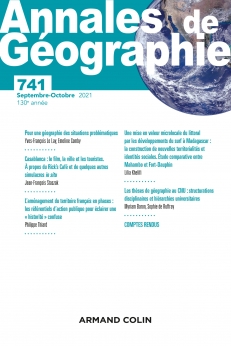
ANNALES DE GÉOGRAPHIE - N° 741 (5/2021)
Pour acheter ce numéro, contactez-nous
Recevez les numéros de l'année en cours et accédez à l'intégralité des articles en ligne.
Un réexamen de l’aménagement du territoire français au croisement des concepts de la géohistoire et de l’approche cognitive des politiques publiques (référentiels d’action publique) ouvre des perspectives nouvelles pour une nouvelle compréhension des temporalités propres à cette modalité d’action (émergences, rythmes, décalages, transitions, sens...). Grâce au concept de régime de réflexivité proposé par les politistes ayant théorisé ce courant de la science politique, il est possible d’expliciter l’articulation complexe de la pensée et de l’action aménagiste puis de révéler trois des constantes de l’aménagement du territoire en France que sont, selon des modalités renouvelées lors des changements de référentiel, le rapport de la société aux inégalités spatiales, la revendication de l’équilibre et la scalabilité.
A re-examination of French spatial and regional planning at the crossroads of the concepts of geohistory and the cognitive approach to public policies (public action standards) opens up new perspectives for a new understanding of the temporalities specific to this mode of action (emergences, rhythms, shifts, transitions, direction...). Thanks to the concept of regime of reflexivity proposed by the political scientists who theorized this current of political science, it is possible to define closely the complex connections of spatial planning thought and action and then to reveal three of the constants of regional planning in France that are, according to methods renewed during changes of action standards, the relationship of society to spatial inequalities, the demand for balance and scalability.